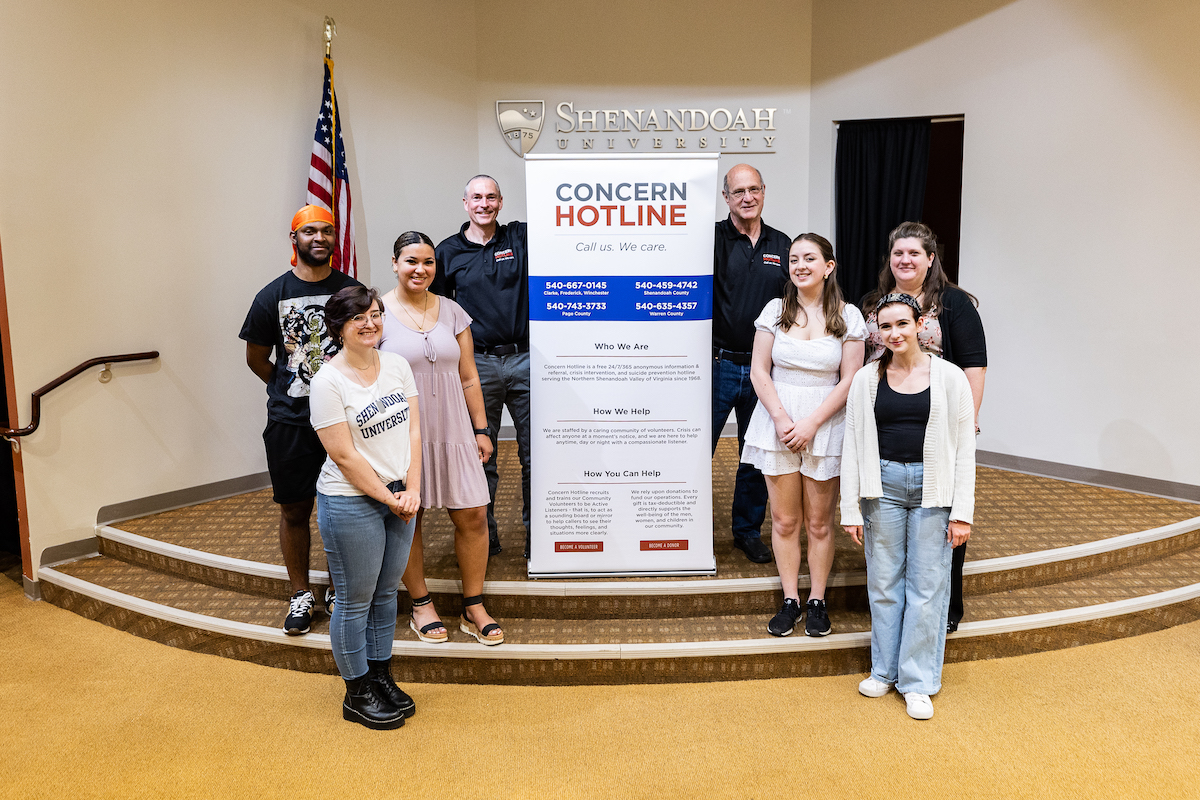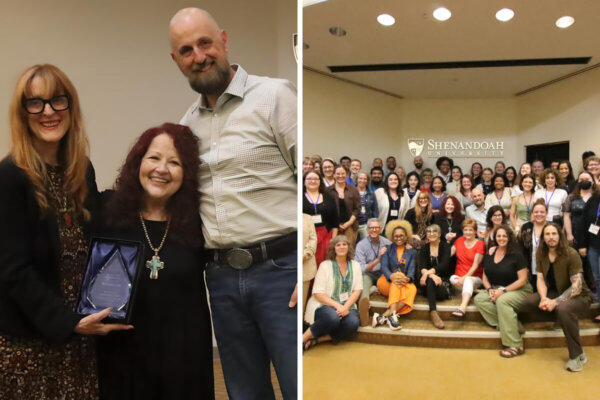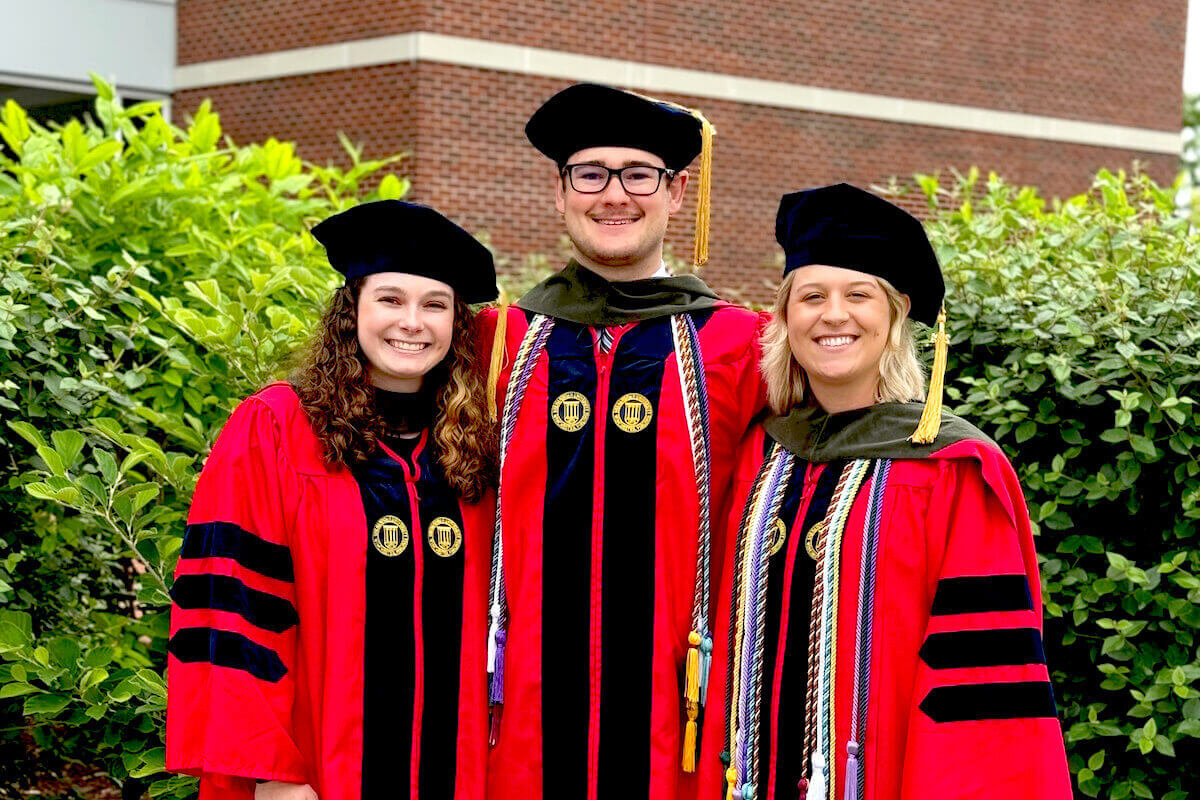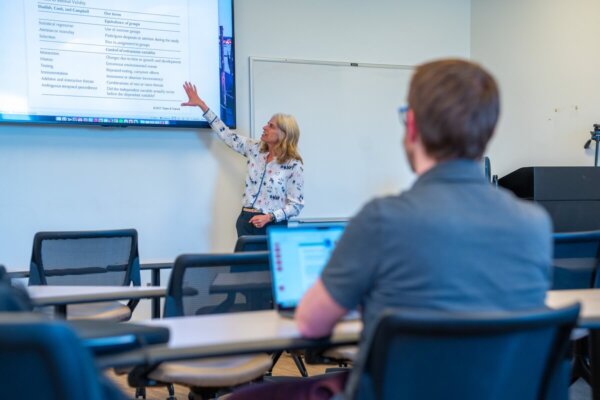Shenandoah Psychology Class Provides Steady Flow Of Volunteers For Concern Hotline
Students in Clinical Helping Skills course serve as listeners for region’s mental health hotline

For 55 years, Concern Hotline has provided an open ear for people in Virginia’s Northern Shenandoah Valley who are facing a mental health crisis, are seeking information or resources, or simply need someone to talk to. For the past few years, Shenandoah University Professor of Psychology Rodney Bragdon, Ph.D., has helped provide the hotline with a steady stream of volunteer listeners through one of his courses.
Every semester for the past four years, students in Dr. Bragdon’s Clinical Helping Skills course have dedicated their time outside of class to work shifts for Concern Hotline. In fact, the entire course is built around being a volunteer listener for the hotline, which is a free, around-the-clock, anonymous information and referral, crisis intervention, and suicide prevention resource serving the city of Winchester and Clarke, Frederick, Page, Shenandoah and Warren counties.
Students who enroll in the course take part in a daylong training session, led by Concern Hotline Program Coordinator Charly Franks, the Saturday before the semester starts. The training puts the students through different mock scenarios. Bragdon supplements that training by inviting Franks to the first three class periods to continue working with the students.
When Bragdon and Franks believe the students are prepared to take calls for the hotline, the students sign up for weekly four-hour shifts that fit their academic schedule. Throughout the semester, the first 30 minutes of each class, which meets once a week for 2 ½ hours, is set aside for students to discuss the calls they received during their shifts.
I want to be a clinical psychologist, so this class has really equipped me with a lot of skills to adapt to listening to hard stories and listening when people are in that time of need. It’s opened my eyes to the path that I want to take, and it’s just reassured me in everything that I’m doing and has given me the hands-on experience that you really can’t get in any other class.”
Trinity Byers, SU student who will graduate with a Bachelor of Science in Psychology in December 2023
Providing that real-life experience was Bragdon’s goal when he came up with the idea for the course. Bragdon, a longtime member of Concern Hotline’s board of directors, is always looking for ways to add service-learning components to his advanced courses to help bridge the gap between the classroom and real-world experience for his students.
People need that human connection that we just are lacking in some areas. For the students to be able to provide that service and be that one person that someone might need a little bit of support from in that moment of need, I think is a very powerful experience for them. Every semester we get a handful of those calls where we really think we made a really big impact, and that’s a great thing for them to experience and feel.”
Rodney Bragdon, Ph.D., Shenandoah University professor of psychology
Concern Hotline is not a therapy line, Franks said, nor is it an advice line. Its listeners are there to be an open ear for a person in need, though they are trained to intervene if the person is in danger or a call escalates to a discussion about suicide.
SU student Megan Vardiman, who also graduates in December, said a listener’s first job is to determine why the person is calling and to assess whether or not that person is in danger. Once they know the caller is safe, the listener then figures out if the caller needs resources or to be connected with a professional, or simply just needs to talk.
“A lot of people have said to me, ‘I just needed to hear another human’s voice.’ Most of my calls have been that,” Vardiman said. “People say all the time, thank you so much for just being there, because having another human on the other end of the phone means so much.”
Sometimes, though, the calls aren’t so easy. Zyquis Triplett ’23, another of the seven students in Bragdon’s class, said he’s fielded the most calls of anyone else in the class this semester – about one call per shift.
“I’ve had some very intense, difficult calls and moments that kind of shock you and put you in a frozen state in the moment,” Triplett said. “But once they get through their piece and you kind of process and analyze everything that they told you, we go back through our skills and just try to work with them the best way that we see fit, how we can best help them.”
Sometimes you don’t get to know what happens after you hang up the phone, and that can be really difficult sometimes. But at the end of the day, you have to think about doing the best that you can for people in the moment and being able to comfort them and calm them down. When you have a good call and things go well and you’re able to provide the resources, and you can literally hear the emotion change in someone’s voice, from crying to having a plan in place – there’s nothing more rewarding than that.”
Trinity Byers
To volunteer for Concern Hotline, call 540-536-1630 or visit concernhotline.org/volunteers. An information table will be set up outside Shenandoah University’s Allen Dining Hall on April 28, from 11 a.m.-1 p.m. for any SU students, staff or faculty who are interested in learning more about becoming a volunteer listener.
Franks, who noted that there is a “great need” for listeners, said Concern Hotline is always looking for volunteers who are compassionate and willing and able to devote time to a shift. While he stopped short of saying anyone can be an effective listener, he said Concern Hotline trains its volunteers to succeed, and many people who don’t think they’re cut out to serve on a hotline end up becoming some of the best active listeners.
“Anybody can learn how to be compassionate to other people,” Vardiman said. “If you’re just willing to be open to whatever they need, anybody could do it. It’s just having that desire to want to help.”
Those in need of Concern Hotline’s services can contact any of the five supported hotline numbers to speak with a volunteer:
- Winchester: 540-667-0145
- Clarke & Frederick counties: 540-667-0145
- Page County: 540-743-3733
- Shenandoah County: 540-459-4742
- Warren County: 540-635-4357





